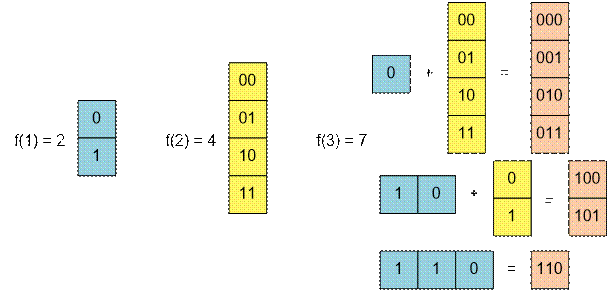Algorithm Analysis
Let's denote by the number of sought sequences of 0s and 1s of length . If the first position of the sequence contains a 0, then starting from the second position, one can construct sequences. If the first position contains a 1, then both variants are possible for the second position. If there is a 0, then on the next free positions, one can construct sequences. If there is a 1, then a 0 must be present at the third position, and starting from the fourth position, one can construct sequences.
We have the recurrence relation: . It remains to compute the initial values:
, since there are two sequences of length 1: 0 and 1.
, since there are four sequences of length 2: 00, 01, 10, and 11.
, since there are seven sequences of length 3: 000, 001, 010, 011, 100, 101, and 110.
Example

Algorithm Implementation
Declare an array f, in which we will store the values f(1), f(2), …, f(n).
int f[100010];
Read the input value n.
scanf("%d",&n);Store in the respective cells of the array f the values f(1), f(2), and f(3).
f[1] = 2; f[2] = 4; f[3] = 7;
Compute the value of f(i) using the recurrence formula. Perform the computation modulo 12345.
for(i = 4; i <= n; i++)
f[i] = (f[i-1] + f[i-2] + f[i-3]) % 12345;Output the answer.
printf("%d\n",f[n]);Algorithm Implementation – Recursion + Memoization
Declare an array dp for memoizing the results: dp[i] will store the value f(i).
int dp[100001];
Implement the function f(n) – the number of sought sequences of 0s and 1s of length n. Use the memoization technique.
int f(int n)
{
if (n == 1) return 2;
if (n == 2) return 4;
if (n == 3) return 7;
if (dp[n] != -1) return dp[n];
return dp[n] = (f(n-1) + f(n-2) + f(n-3)) % 12345;
}The main part of the program. Read the input value n.
scanf("%d",&n);Initialize the array dp.
memset(dp,-1,sizeof(dp));
Compute and output the value f(n).
printf("%d\n",f(n));Java Implementation
import java.util.*;
public class Main
{
public static int MAX = 100010;
static int f[] = new int[MAX];
public static void main(String[] args)
{
Scanner con = new Scanner(System.in);
int n = con.nextInt();
f[1] = 2; f[2] = 4; f[3] = 7;
for(int i = 4; i <= n; i++)
f[i] = (f[i-1] + f[i-2] + f[i-3]) % 12345;
System.out.println(f[n]);
con.close();
}
}Python Implementation
n = int(input())
dp = [0] * (n + 4)
dp[1], dp[2], dp[3] = 2, 4, 7
for i in range(4, n + 1):
dp[i] = (dp[i-1] + dp[i-2] + dp[i-3]) % 12345;
print(dp[n])Python Implementation – Recursion with Memoization
Increase the stack size for recursion.
import sys
sys.setrecursionlimit(10000)
def f(n):
if n == 1: return 2
if n == 2: return 4
if n == 3: return 7
if dp[n] != -1: return dp[n]
dp[n] = (f(n - 1) + f(n - 2) + f(n - 3)) % 12345
return dp[n]
n = int(input())
dp = [-1] * 100001
print(f(n))